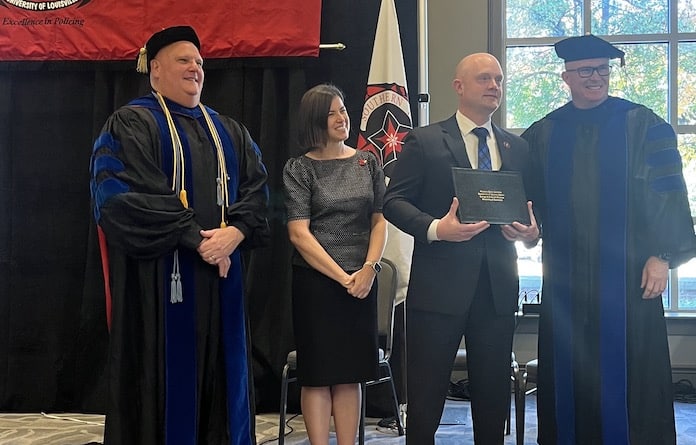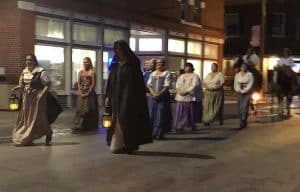Advanced training for CPD sergeant

A Columbia Police Department sergeant recently completed a 12-week course at the Southern Police Institute of the University of Louisville which has allowed him to reflect on his career and return to the department with a new perspective on the law enforcement profession.
Josh Bayer has always been a resident of Columbia. After graduating from Columbia High School, he attended Southwestern Illinois College – then known as Belleville Area College – for two years.
Bayer recalled joining the CPD right out of college, having tested for the open position when it was advertised. He went into training in the fall of 2003 and continued from there as an officer.
Bayer explained he doesn’t have a family history in policing, his interest in law enforcement instead stemming from prior years where he worked part-time as a dispatcher in the community.
“It was pretty much just a general interest, something I thought I would like to take a look at and get into. Not one specific thing really sparked it other than I enjoyed working with the employees in the dispatch element, and that’s pretty much why I stuck around.”
Bayer spoke positively about his ongoing career within the department. He noted how he was the first officer in the community to work with a police dog, with the department’s K-9 units expanding in recent years.
Bayer received his promotion to sergeant around 2010.
Bayer further spoke about his continued involvement in the communication center and its 911 operations, also pointing to his work as a first responder elsewhere in the community.
“I’m also an EMT with our ambulance service,” Bayer said. “There are occasions where I’m able to utilize the training and experience and cross-reference that on certain types of incidents that occur. I enjoy both aspects of the first responder industry, if you will.”
Regarding his most recent work, Bayer has spent the last three months attending an Administrative Officers Course.
The course, as he described, is a sort of advanced training which he applied for last year in order to be accepted earlier this year.
It was a unique experience for Bayer, as it was his first time staying on a university campus. He said there were over 30 other officers attending the course, coming to the University of Louisville from all across the country.
As Bayer described, the program consisted of what were essentially four graduate level courses: criminal justice leadership, trauma informed policing, criminal justice administration and managing organizational performance.
Bayer emphasized how the information from these courses seemed to come from a great deal of research, with approaches to law enforcement based in existing practices backed by evidence.
While Bayer offered a broad perspective of what the program covered, one of his more particular takeaways concerned how officers work with the community in order to act more efficiently and effectively.
He said that mobilization – local law enforcement responding to incidents in the community – relies hugely on notifications and alerts from citizens, thus it’s vital that the police department and officers have good relations within the community.
“There was a lot of instruction and topics covered on procedural justice,” Bayer said. “And really, at the end of the day, all that is is a customer-service based approach to policing. We want cooperation from our community.”
Columbia Police Chief Jason Donjon offered an additional perspective on the training, saying it provided Bayer with a brief respite from his job.
Donjon added the training provides officers with a time to find their roots and remind themselves why they got into law enforcement to begin with.
“What I take away from these trainings is that it kind of resets your battery, if you will,” Donjon said. “Why you got into the profession — what they really stress at this kind of training — is to serve and to protect. Sometimes, in our profession but I think all first-responder professions. After a few years, you can kinda fall into a pattern. Some people can get disgruntled and some people can get through it, but this kind of training really helps you go back to why you got into it.”
Both Donjon and Bayer noted that Bayer was the first among Columbia’s sergeants to participate in the training, with all other sergeants hopefully attending sometime in the future.
Donjon expressed his appreciation for Bayer and the knowledge he will bring to the department, while Bayer noted that he is only one person and will be relying on the efforts of everyone else in the department as he tries to apply this new training.
“It’s about improving our legitimacy, efficiency and effectiveness of the organization,” Bayer said. “I’m not saying we’re doing anything wrong currently or whatever, but there’s other ideas out there. There’s other things that have worked. We can bring that research back with those other ideas that may have worked in other cities and communities throughout the United States and then you mold that to fit our needs.”






